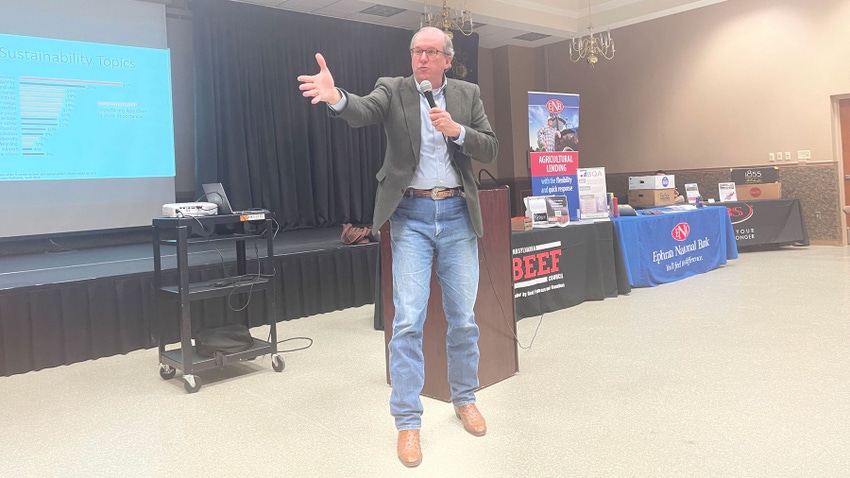
If you’re a beef producer and wondering what’s going to get done in Washington, D.C., now that a new Congress is in place, Colin Woodall has a message:
"For the next two years, we're going to have a logjam,” the CEO of the National Cattlemen’s Beef Association (NCBA) told beef producers gathered for Lancaster Cattle Feeders Day. But that may not be a bad thing, at least for cattle producers.
“If Congress isn’t messing anything up, that’s less regs that we as the regulated entities have to worry about,” he said. “So, I don’t sweat it that the next two years are going to be dictated by a logjam because it means only the best legislation everybody can agree with will get passed, and these days that’s pretty slim. We can work with that.”
Still, a lot will be happening on Capitol Hill this year that could affect not only beef producers, but also other farmers, too. Here are four issues to keep an eye on:
1. Farm bill. Negotiations on a new farm bill — the current farm bill expires Sept. 30 — is top of mind for beef’s largest trade association, Woodall said. He praised Rep. Glenn “GT” Thompson’s goal of getting a farm bill done on time. Thompson, of Pennsylvania, is the House Ag Committee chairman. But as Woodall points out, “It’s been a long time since a farm bill got passed on time. So, we do need to step back and be prepared for some sort of extension. Just taking what we have and kicking the can down the road.”
And with the House now in Republican hands, Woodall said to expect a lot more discussion on the structure and funding of the farm bill. More than 80% of farm bill funding goes to federal food programs. Many Republican lawmakers want to see this changed, he said, so expect many questions on the floor of the House before any farm bill is even considered, let alone voted on.
He said the top farm bill issues for NCBA include maintaining funding for the foot-and-mouth disease vaccine bank — authorized in the 2018 Farm Bill — as well as maintaining funding for conservation programs such as the Environmental Quality Incentives Program (EQIP), and risk management programs like Livestock Risk Protection.
2. WOTUS. Waters of the United States (WOTUS) is back, and ag groups have filed suit even as the Supreme Court is expected to rule soon in a case that will likely affect the jurisdictional reach of the Clean Water Act on the country’s waters and wetlands.
NCBA is one of the ag groups listed as a plaintiff in the case.
Woodall, characterizing WOTUS as a “land grab” by the Environmental Protection Agency and U.S. Army Corps of Engineers, said the ag groups are seeking injunctive relief ahead of the expected Supreme Court decision.
“So, the Biden administration moving forward without that Supreme Court decision doesn’t make any sense at all, because if they move forward, all the sudden the Supreme Court comes up with something different, then we’re in no better place,” he said. “So, we’re asking the courts to stop this until we see what the Supreme Court decides.”
Woodall said one practical impact of the WOTUS rule would be forcing landowners to file for a Section 404 Clean Water Act permit to use water features, or the land surrounding these water features, in the future. There is already a two-year backlog on getting these permits. “Now imagine farmers having to sign up for it,” Woodall said. “It’s an absolute nightmare of where we’re headed.”
3. Scope 3 emissions. The Securities and Exchange Commission last year proposed a rule that would require any publicly traded company to report greenhouse gas emissions.
According to the proposed rule, the goal is to provide investors with useful information to assess a company’s exposure to, and management of, climate-related risks. But Woodall said the rule could have a big impact on farms, especially under the rule’s proposed Scope 3 emissions section. Under the rule, greenhouse gas emissions from up and down a company’s value chain would have to be reported.
“It’s going to boil down to their suppliers, which are the producers,” Woodall said. “So, if you have a deal with Tyson, or maybe you have no idea if your cattle end up with Tyson, but that liability is going to land on our shoulders. This can trickle down to farmers if Scope 3 is included.”
4. Dietary guidelines. The next set of dietary guidelines for Americans will be released in 2025.
Every five years the guidelines are updated, and government meal programs, including school lunch programs, must adhere to these guidelines.
Woodall said NCBA’s priority is to ensure anything related to beef is included in the next set of guidelines. But it covers a wide range of foods, including milk, and it has become a hot issue with people hoping the government reverses course to recommend whole milk, a precursor to once again allowing whole milk back in schools.
About the Author(s)
You May Also Like






